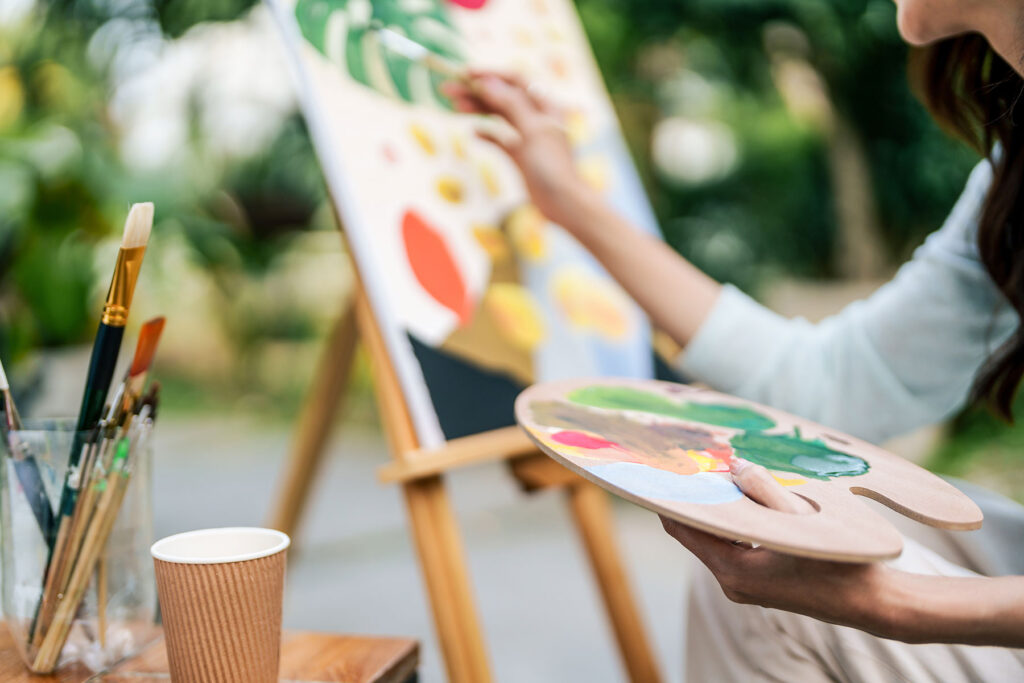Art therapy is a therapeutic practice that uses art in various forms to foster communication and self-expression for emotional and psychological well-being. Art therapy combines traditional psychotherapy techniques with creative processes to facilitate self-exploration, growth, and healing. It mainly benefits patients who struggle with verbal expression or resist conventional talk therapy.
An art therapy program can be integral to comprehensive treatment for individuals struggling with mental health, substance use, or co-occurring disorders. At Ashwood Recovery, we understand that sometimes it can be challenging to find the words to express yourself, so we offer an art therapy program led by trained and licensed art therapists with extensive knowledge of psychology, human development, and artistic processes. Contact Ashwood Recovery at 888.341.3607 to discover how art therapy can help yourself or your loved one.
What Is Art Therapy for the Treatment of Mental Health?
Self-expression is one of the fundamental ways to assert our personality traits and a large part of how we connect with others. People with mental health or substance use disorders often struggle with self-expression because they have become out of touch with their feelings, and their communication skills have often become impaired. Art therapy for mental health treatment can help patients learn how to reconnect with their emotions and communicate effectively.
An art therapist provides a safe and supportive environment where patients can explore their thoughts, feelings, and experiences without talking about them. The non-verbal aspect of art therapy allows patients to bypass language barriers and access more profound memories, emotions, and subconscious thoughts.
Art therapy can take place in individual or group settings. The therapist guides patients through the creative process and facilitates discussions to interpret and understand the meaning behind the art. Patients do not need artistic ability. Art therapy is about the process, not the end product.
Examples and Methods of Art Therapy
Art therapy uses the creative process as a healing tool. Studies have shown that just being exposed to art, in any form, can improve mental health. Art therapy is not a primary treatment but is used as a supplement with other evidence-based therapies to address the causes and symptoms of substance use disorders and mental health conditions.
Common approaches to art therapy include:
- Free art expression – Patients are encouraged to create art freely without guidelines or goals.
- Guided imagery – The therapist guides patients through an imaginative journey, after which patients create art representing the experience.
- Art journaling – Patients are encouraged to keep a journal outside therapy sessions, using writing and visual art for self-reflection and self-expression.
- Narrative art therapy – Patients create a series of artworks that represent their life stories or significant events.
- Mandalas and patterns – Creating and coloring mandalas or patterns helps promote relaxation, focus, and mindfulness.
- Therapeutic photography – Patients take photographs representing their emotions, thoughts, or experiences. The images can be used in other projects or foster therapeutic dialog.
- Art-based relaxation – Art therapy techniques, like creating mandalas, are combined with relaxation techniques, like deep-breathing exercises.
Art therapy can be conducted in a group setting where patients collaborate on collective art projects, fostering a sense of community, supporting social skills development, and promoting communication and teamwork. Group art therapy helps individual patients recognize that they are not alone and that others have similar or shared experiences.
Learn More About Our Mental Health Treatment Services
Our outpatient programs provide flexible treatment options so patients can receive comprehensive treatment while maintaining their daily obligations to work, school, or home. In addition to our art therapy program, Ashwood Recovery offers an array of evidence-based and holistic treatment modalities, including:
- 12-step groups
- Cognitive-behavioral therapy (CBT)
- Family therapy
- Group therapy
- Mindfulness and meditation
- Trauma resolution therapy
- Dialectical behavior therapy (DBT)
- Relapse prevention
- Dual diagnosis treatment
Ashwood Recovery is dedicated to treating individuals and families struggling with substance use disorders (SUD), mental health disorders, or unresolved trauma in a safe, inclusive, and non-judgmental environment.
Find Art Therapy in Idaho at Ashwood Recovery
At Ashwood Recovery, we recognize that SUD, trauma, and mental health conditions impact everyone differently and provide treatment tailored to each patient’s unique needs and circumstances. Contact Ashwood Recovery today at 888.341.3607 to learn more about our programs, including art therapy.

